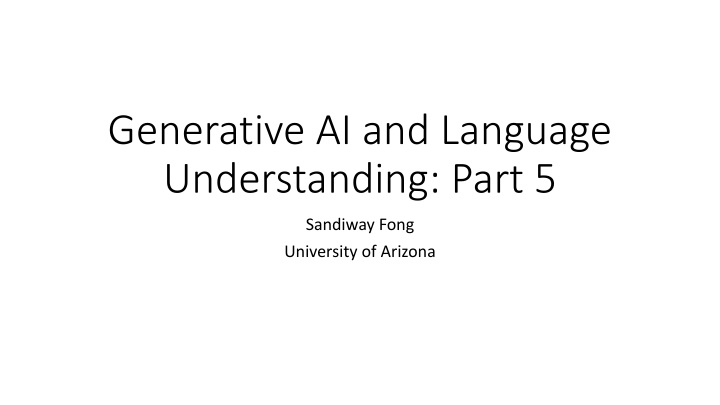
Decoding Generative AI and Language Understanding: Insights from Google NL and ChatGPT
Explore the world of generative AI and language understanding through insights from Sandiway Fong at the University of Arizona. Discover the power of relative clauses and embedding in English and how Google NL and ChatGPT accurately analyze sentence relations. Witness the capabilities of Google Bard in grammar analysis.
Download Presentation

Please find below an Image/Link to download the presentation.
The content on the website is provided AS IS for your information and personal use only. It may not be sold, licensed, or shared on other websites without obtaining consent from the author. If you encounter any issues during the download, it is possible that the publisher has removed the file from their server.
You are allowed to download the files provided on this website for personal or commercial use, subject to the condition that they are used lawfully. All files are the property of their respective owners.
The content on the website is provided AS IS for your information and personal use only. It may not be sold, licensed, or shared on other websites without obtaining consent from the author.
E N D
Presentation Transcript
Generative AI and Language Understanding: Part 5 Sandiway Fong University of Arizona
This is the era of Generative AI https://bard.google.com https://chat.openai.com/chat
Relative Clauses and Embedding English is very productive when it comes to relativization. We can relativize any argument of the verb, and adjuncts too. Examples: the man left the room at 6pm the man who left the room at 6pm (subject) the room the man left at 6pm the time the man left the room at (adjunct) Can also recursively apply relativization but center embedding is hard for humans to interpret (perhaps due to performance limitations) (Basic sentence) (object)
Relative Clauses and Embedding object vs. subject relativization
Google Bard All messed up about grammar! What does Google NL think of the sentence? See next slide Perhaps it could ask Google NL to help out?
Google Natural Language nsubj: nominal subject relation dobj: direct object relation rcmod: relative clause modifier relation correctly analyses the relations: ate(man, sandwich) saw(cat, man) chased(dog, chat)
Google Bard Recall, Google NL correctly analyses the relations: ate(man, sandwich) saw(cat, man) chased(dog, chat)
Google Bard Recall, Google NL correctly analyses the relations: ate(man, sandwich) saw(cat, man) chased(dog, chat)
Berkeley Neural Parser Analysis from a well- known constituent parser
ChatGPT Let's make the sentence a little easier to parse
